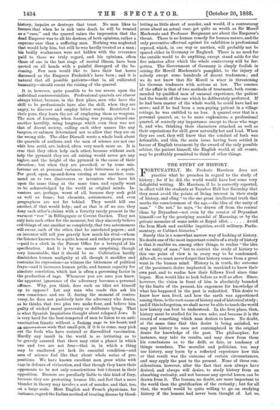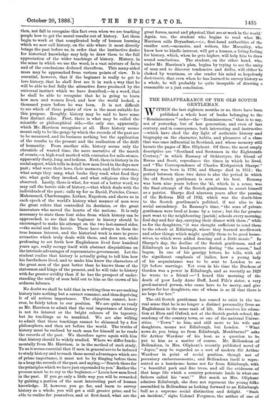THE STUDY OF HISTORY.
FORT1JN.A.TELY, Mr. Frederic Harrison does not
practise what he preaches in regard to the study of history ; for if he did, the world would have lost some very delightful writing. Mr. Harrison, if he is correctly reported, in effect told the students at Toynbee Hall last Saturday that they must avoid the points of living interest in their study of history, and cling "to the one great intellectual truth that marks the consciousness of the age,—the idea of the unity of man." "Do not," he says, "be drawn off from the central ideas by Dryasclust—not even by the creator of Dryasdust himself—or by the gossiping scandal of Macaulay, or by the private memoirs of some noble or Royal idiot Avoid the Iron Mask and suchlike inquiries, avoid military, Parlia- mentary, or Cabinet histories."
Surely this is a somewhat narrow way of looking at history. No doubt one of the most important results of a study of history is that it enables us, among other things, to realise "the idea of the unity of man ;" but to restrict the study of history to this one point of view is in every way to be condemned. After all, we must never forget that history comes from a great want in the human mind. History is, in truth, the outcome of the passionate desire implanted in mankind to know their own past, and to realise how their fellows lived since time began. Man would like to look before as well as after. Since, however, the vision in front of him is absolutely bounded by the limits of the present, his eagerness for knowledge of what has happened in the past is redoubled. This desire to know how men lived, and how the earth was apportioned among them, is the root-cause of history and of historical study; and if this is forgotten, we shall never be able to teach the world how history can best be understood.- L_r_i the first place, then, history must be studied for its own sake, and because it is the record of something which man desires to know. No doubt, at the same time that this desire is being satisfied, we may put history to uses not contemplated in the original desire for knowledge of the past. The philosopher, for instance, may take its results, and may draw from them his conclusions as to the drift, or fate, or tendency of things mundane. The moralist and politician, too, may use history, may learn by a reflected experience how this or that result was the outcome of certain circumstances, and may apply the past to the present. None of these con- siderations, however, alter the fact that men always have desired, and always will desire, to study history from an absorbing curiosity, and not because any special lesson can be drawn from it. The lessons, no doubt, are more important to the world than the gratification of the curiosity ; but for all that, the world would be quite willing to go on studying history if the lessons had never been thought of. Let us,
then, not fail to recognise this fact even when we are teaching 'people how to get the moral results out of history. Let them begin to work at that complicated body of human learning which we now call history, on the side where it most directly brings the past before us, in order that the instinctive desire for historical knowledge may help to draw them to the full appreciation of the wider teachings of history. History, in the sense in which we use the word, is a vast mixture of facts and of the conclusions deduced therefrom. This many-sided mass may be approached from various points of view. It is essential, however, that if the beginner is really to get to love history, that he shall first see it in such a way that he will be able to feel fully the attractive force produced by the universal instinct which we have described,—in a word, that he shall be able to recognise that he is going to learn how men and women lived, and how the world looked, a thousand years before he was born. It is not difficult to see which of these points of view is the most suitable for this purpose. Roughly, history may be said to have some four distinct sides. First, there is what may be called the scientific or philosophical side,—the only one, apparently, which Mr. Harrison recognises at all. Here history seems meant only to be the gauge by which the records of the past are to be measured, and its business nothing but the application of the results to the present and the realisation of the drift of humanity. From another side, history seems only the chronicle of wasted time, the mere narrative of the march of events,---a high-road marked with centuries for mile-stones, apparently dusty, long, and tedious. Next, there is history in its social aspect, which tells in detail how men lived in the days now past ; what were their laws, their manners, and their customs ; what songs they sang, what books they read, what food they ate, what gods they invoked, and what religious rites they observed. Lastly, there is what, for want of a better word, we may call the heroic side of history,—that which deals with the individuals of the past; calls up for us David, Pericles, Cmsar, Mahommed, Charlemagne, Luther, Napoleon, and shows us in each epoch of the world's history what manner of men were the great rulers that controlled its destinies, or the great innovators who moved the hearts of the nations, it is only necessary to state these four sides from which history can be approached, to see that the beginner in history should be encouraged to make his attempt on the two last-named sides, —the social and the heroic. These have always in them the true human interest, and the historical work is sure to prove attractive which truly deals with them, and does not, while professing to set forth how Englishmen lived four hundred years ago, really occupy itself with abstract disquisitions on the intrinsic advantages of representaive government. Let the student realise that history is actually going to tell him how his forefathers lived, and to make him know the characters of the great men of the past better than he knows those of the statesmen and kings of the present, and he will take to history with far greater avidity than if he has the prospect of under- standing the unity of man held out to him as the crown of his arduous labours.
No doubt we shall be told that in writing thus we are making history into nothing but a correct romance, and thus depriving it of all serious importance. The objection cannot, how- ever, be fairly taken to our position. We are quite as ready as Mr. Harrison to admit that the real importance of history is not its interest or the bright colours of its tapestry, but its teachings as to mankind. We are also willing to admit that these teachings cannot be skimmed by a few philosophers, and then set before the world. The truths of history must be realised by each man for himself as he reads the records of the past. We therefore agree again with him that history should be widely studied. Where we differ funda- mentally from Mr. Harrison, is in the method of such study. To us it seems essential that if men in general are to be induced to study history and to reach those moral advantages which are of prime importance, it must not be by flinging before them in a heap the records of the past, and saying,—' Search there for the principles which we have just expounded to you.' Rather the process must be to say to the beginner,--' Learn how men lived in the past. If you go only a little way you will be rewarded by gaining a portion of the most interesting part of human knowledge. If, however, you go far, and learn to survey history as a whole, you will get a still greater prize, and be able to realise for yourselves, and at first-hand, what are the
great forces, moral and physical;that are at work in the world.' Again, too, the student who begins to read what Mr. 'Harrison calls Dryasdust,—i.e., first-hand authorities of the smaller sort,—memoirs, and writers, like Macaulay, who know how to kindle interest, will get a human, a living feeling for history, which, when he gets higher, will help him to draw sound conclusions. The student, on the other hand, who, under Mr. Harrison's plan, begins by *trying to see the unity of man and to discover tendencies and drifts, will either-be choked by weariness, or else render his mind so hopelessly doctrinaire, that even when he has learned to survey history as a whole, he will probably be quite incapable of drawing a reasonable or a just conclusion.



































 Previous page
Previous page